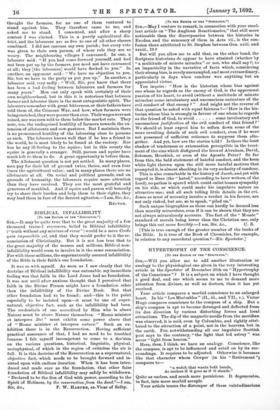[To THZ EDITOR OF THZ " SPEOTATOR:]
Sia,—May I venture to remark, in connection with your excel- lent article on " The Anglican Reactionaries," that still more noticeable than the discrepancies between the histories im Exodus, and the summary of them in Acts vii., is the con- fusion there attributed to St. Stephen between Gen. xxiii. and. xxxiii., 19 P
But will you allow me to add that, on the other hand, the- Scripture historians do appear to have attained (whether by "a multitude of minute miracles" or not, who shall say ?) an impartiality in the narrative of facts which, considering their strong bias, is surely unexampled, and most extraordinary,. particularly in days when candour was anything but an appreciated virtue.
You inquire : " How is the historian whose bias against one whom he regards as the enemy of God, is the uppermost passion of his heart, to avoid (without a multitude of minute miracles) some involuntary and unconscious caricature of the evil conduct of that enemy ? " And might not the reverse of that question be asked with equal fairness ?—' How is the his- torian whose bias is strongly in favour of one whom he regards.
as the friend of God, to avoid some involuntary and
unconscious justification of the evil conduct of that friend P'
We should at least expect him to soften down some of the
more revolting details of such evil conduct, even if he were not possessed of sufficient reticence to suppress them alto-
gether. And yet, how are the stories told ? Is there the least
shadow of tenderness or extenuation perceptible in the treat- ment of the sins which disfigured the lives of Abraham, David,,
Solomon, Hezekiah, or even of the Apostle Peter? So far from this, the bald statement of hateful conduct, and the keen white light thrown upon the still more hateful motives that prompted it, is almost shocking in its very audacity of candour.
This is also remarkable in the history of Jacob, and yet with regard to Esau (the " hated," according to later writers, of the Lord), no pathos is spared which could enlist human sympathy on his side, or which could make his impulsive nature an attractive one ; and all such telling little details in the evi- dence as must of necessity involve a verdict in his favour, are not only risked, but are, so to speak, "piled on."
Such unique biographies as these can hardly be deemed less than morally miraculous, even if it can be shown that they are not always miraculously accurate. The fact of the " Mosaic" standard of morals being lower than the Christian one, only- brings this out more forcibly.—I am, Sir, &c., C. S. [This is true enough of the greater number of the books of the Bible. Is it true of the Book of Chronicles, for example,. in relation to any sacerdotal question P—En. Spectator.]














































 Previous page
Previous page